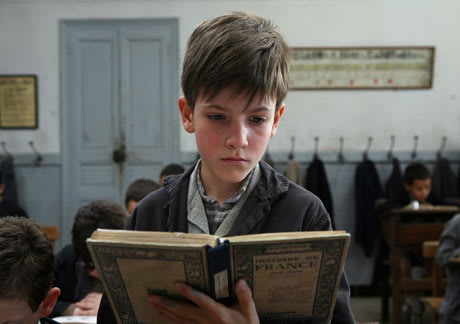Winner of the Prize of the International Critics (FIPRESCI Prize) for Special Presentation, The First Man is a beautiful adaptation of Albert Camus's unfinished autobiographical novel, which was discovered in the wreckage of his fatal automobile accident. It is a masterful meditation on Camus's sullen return to his hometown and childhood in Algeria. As well, the film paints a poignant, yet tragic, picture of the tumultuous racial relations between the French and Arabs in Algeria during the mid-'50s.
Immediately The First Man sets its tone by opening on a lush graveyard with sparse, haunting violin music filling the landscape. Jacques Cormery (Jacques Gamblin) has returned to Algeria after spending many years writing in France. Cormery's homecoming is met with unease, as many nationalists believe he's no longer Algerian, but a French traitor. Cormery ignores the angry shouts and arrives at the home of his illiterate mother, Catherine (Catherine Sola). Catherine is gentle and immensely proud of her son. The relationship between the mother and son is a rare, indescribable union, and their shared benevolence summons profound emotions and the welling of bittersweet tears.
After a series of violent events, Cormery is reminded of his reticent, but stern grandmother and his boyhood. The film cleverly shifts in temporality and the audience is introduced to Cormery as a young, altruistic child. The charming air and angelic face of the young boy running through the small town are instantly evocative of Albert Lamorisse's enchanting 1956 work, The Red Balloon. Both movies deliver a sense of effortlessness and simplicity. However, The First Man is set within a world of turmoil.
Cormery's past and present visits with his grandmother and his former Arab friend are intense. Even as a man, Cormery is unconditional with his loyalty and attempts to save his friend's son from his impending execution, on the grounds of his involvement with bombing civilians.
Every element in this film, from character development to cinematography, is brilliantly (even perfectly) crafted. The performances by Sola and Gamblin are unique and unforgettable. This is by far one of the strongest and most emotionally raw foreign films to premiere at TIFF.
(Studio Canal)Immediately The First Man sets its tone by opening on a lush graveyard with sparse, haunting violin music filling the landscape. Jacques Cormery (Jacques Gamblin) has returned to Algeria after spending many years writing in France. Cormery's homecoming is met with unease, as many nationalists believe he's no longer Algerian, but a French traitor. Cormery ignores the angry shouts and arrives at the home of his illiterate mother, Catherine (Catherine Sola). Catherine is gentle and immensely proud of her son. The relationship between the mother and son is a rare, indescribable union, and their shared benevolence summons profound emotions and the welling of bittersweet tears.
After a series of violent events, Cormery is reminded of his reticent, but stern grandmother and his boyhood. The film cleverly shifts in temporality and the audience is introduced to Cormery as a young, altruistic child. The charming air and angelic face of the young boy running through the small town are instantly evocative of Albert Lamorisse's enchanting 1956 work, The Red Balloon. Both movies deliver a sense of effortlessness and simplicity. However, The First Man is set within a world of turmoil.
Cormery's past and present visits with his grandmother and his former Arab friend are intense. Even as a man, Cormery is unconditional with his loyalty and attempts to save his friend's son from his impending execution, on the grounds of his involvement with bombing civilians.
Every element in this film, from character development to cinematography, is brilliantly (even perfectly) crafted. The performances by Sola and Gamblin are unique and unforgettable. This is by far one of the strongest and most emotionally raw foreign films to premiere at TIFF.
